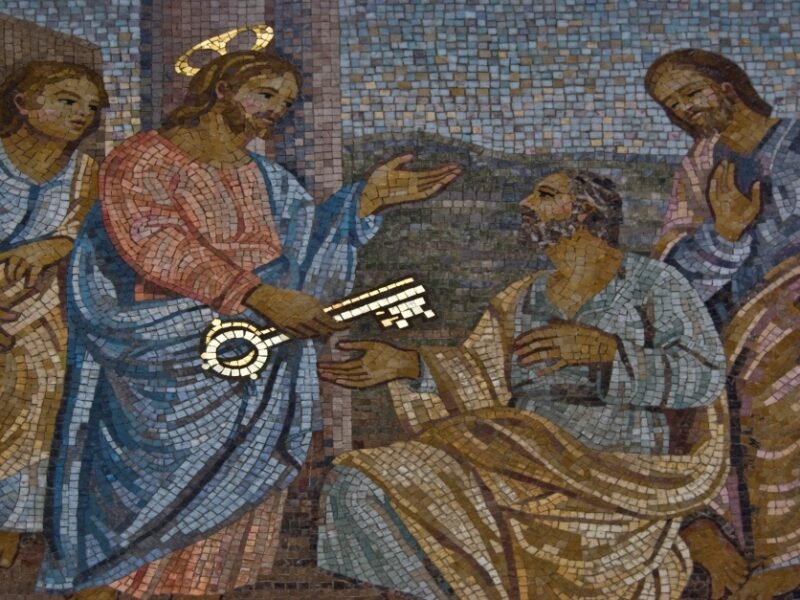This is an essay about the place of Scripture in the Anglican Church of North America (ACNA). The characterization of the ACNA in this paper comes from my own observation as a member of it and as a student at one of its more recognizable seminaries, Trinity School for Ministry. My observations probably say more about the sample of churches, clergy, and parishioners with whom I have interacted than about the denomination as a whole, but I hazard that what I have witnessed may resemble many others’ experiences. I am writing this to encourage those who share my concern about the place of Scripture in our young denomination and provide a positive vision of what that place may be.
Almost every member of the ACNA with whom I’ve enjoyed conversation was not baptized an Anglican, and fewer and fewer in our parishes were baptized Episcopalian. The ACNA is a very young denomination in three senses: the denomination is not yet twenty years old; its parishioners are typically young; and if they are not young in age, they are young in Anglicanism. Many of the ACNA’s parishioners have transferred into the church from another denomination or another, unaffiliated church, especially considering the increasingly nondenominational character of the American church. American churches are more and more distancing themselves from tradition, and this move has been hugely successful, with the top fifty churches in the nation claiming attendance in the tens of thousands.[1] [2] Some of these members of the American nondenominational church are finding their way into Anglicanism. What is the ACNA selling that young nondenominational-ers are buying?
Although generalized statements are difficult because of the vast variety in the ACNA, I have noticed a trend that goes something like this: a young Christian in her twenties or thirties will find herself disenchanted, discouraged, or otherwise lacking in her experience of church. She tries big, multi-site churches, intimate charismatic fellowships, and everything in between as she moves for college, grad school, and work. Somehow, she finds herself in Grace Trinity Redeemer ACNA, and she encounters something radically new: the liturgy is formal but beautiful and comforting; there is meaning to the structure of the service; there is respect for embodiment in the movements of worship and the attention to beauty; there is a sense of rootedness in the rhythms of the church year; and, most strikingly, Holy Eucharist is celebrated every week with great reverence and attention. She decides to become Anglican.
I rejoice that I have sisters and brothers in the faith who have this story. Having grown up in a sort of Reformed Baptist house church, I have a story similar to it. What I wonder, though, is this: what place does Holy Scripture have in this story? As the saying goes, “What you win them with is what you win them to.” What won this woman’s attention and affections, and how did Scripture factor into that change of heart?
There are many ways of analyzing this sort of transfer from nondenominationalism to Anglicanism. What do American evangelicals lack? Ecclesial rootedness and catholicity, liturgical coherence, sacramental worship, church order and the “beauty of holiness,” a favorite phrase among Anglicans. What does the ACNA provide? In most cases, answers to all the above. In coming to the ACNA, the transferring nondenominationalist has the chance to reinvent her relationship to major elements of the Church (especially the worship style), swapping the present-obsessed nondenominational church for more ancient Anglicanism. I wonder, though, whether nondenominationalists find in the ACNA an opportunity to reinvent their relationship to Scripture as they reinvent their relationship to ecclesiology and liturgy. In American nondenominationalism, Scripture seems to find itself submitted to larger categories such as “mission” or “spiritual growth” or “social justice” or “traditional values.” The Church has some interest X, and Scripture functions as a means to fulfilling that interest. Even a rough survey of church mission statements and sermons among average nondenominational churches demonstrates a tendency to view the Bible as little more than “basic instructions before leaving earth,” something which fits the preexisting decisions of the church.
I argue that a new relationship to Scripture ought to be a hallmark of ACNA parishes that are wooing nondenominationalists into Anglicanism. If evangelicals’ relationship to Scripture is not reinvented, there is a risk of Scripture being neglected in the midst of the exciting and enchanting process of exploring Anglicanism and delighting in its beauty and ancientness. What would this new relationship to Scripture in an Anglican context look like? Of all the possible answers that could be given, I want to commend the following two points to my brothers and sisters in the ACNA who are welcoming nondenominational transferees:
THE CHRISTO-CENTRICITY OF SCRIPTURE
By virtue of its design, Anglican worship is overwhelmingly Christocentric: everything is prayed in-by-with-through Christ. This Christocentric instinct is also the way the Apostles read the Scriptures (the Old Testament). The Apostles understood the Old Testament to be a disclosure of Christ—an actual portrait of him, not merely the wash on top of which the portrait (i.e. the New Testament) is painted. St. Augustine argues in De Doctrina Christiana that words are signs which point to things, and if you asked the Apostles to what the words of the Scriptures point, they would have said Christ.
For the Apostles and the Church Fathers after them, the Scriptures certainly had a literal sense, which is just to say that they were written at a certain time to a certain audience with a certain message. But this literal sense by no means exhausted the meaning of a given text, and the question for the Apostles and the Fathers was not whether there was a sense beyond the literal, but rather how to rank and prioritize these extended senses in relation to the given literal meaning. Treating Scripture as if it has extended senses is the natural way to read it. In American nondenominationalism, the extended sense is usually devotional or moral: the tendency is to read some prophecy or Psalm or epistle and ask, “What is the message here, and how does it apply to me today?” This is a fine and pious question to ask, but if that is the only question asked it can tend to put you as the reader to be the ultimate referent of these words, as if all Scripture were written down to speak of you and your experience. The Apostolic and Patristic rejoinder would be to simply say that Christ is the end of the Law and the Prophets (Matt 5:17), and that all of Scripture ultimately points not to you but to Christ (see Luke 24).
Before Christ took on human flesh, he took on the words of the Old Testament and revealed himself, veiled and hidden, to the Patriarchs and Israel. Just as the disciples on the road to Emmaus did not recognize Christ, so too the Old Testament people of God had experiences and encounters with Christ without fully grasping that reality, as St. Paul lays out dramatically in 1 Cor 10 and elsewhere. The second person of the Trinity did not wait until Bethlehem to involve himself in the affairs of earth; the spoken Word through whom the heavens and the earth were created, the Word written on tablets of stone, the Word which came to the prophets, is that same Word which took on flesh and dwelt among us.[3] We in the ACNA must have our minds opened (Luke 24:45) to see that all the Scriptures—both Testaments—reveal Christ, and that he, not the reader, stands as both the bedrock and the pinnacle of Scriptural reference.[4] This sort of reading has the salutary effect of removing us from the center of the universe and recognizing Christ to be the center of reality. It is a dangerous thing to seek one’s own reflection in Scripture; better instead to seek the face of Christ, a face composed of tens of thousands of words and brushstrokes and verses and hints.
THE GRATUITY OF SCRIPTURE
If the previous section was arguing for the Apostolic and subsequent Patristic understanding of biblical theology as Christocentric, then this section is arguing for a love of Scripture that is characteristic of the English Reformation. It is true that Anglicans love to worship and we delight in the language of liturgy, sacred time, consecrated space, beautiful music, and the celebration of Holy Baptism and Eucharist, but it used to be that Anglicans were also renowned for their celebration and excitement about Scripture. Once a usable translation of the Bible was secured, the 1571 canons of the Church of England mandated that a copy be placed in every church for public use, a thing unheard of before the Reformation.[5] The first of the Homilies is “A Fruitful Exhortation to the Reading and Knowledge of Holy Scriptures,” which begins: “Unto a Christian man, there can be nothing either more necessary, or profitable, than the knowledge of the holy Scripture.”[6] Cranmer’s 1549 preface of the Book of Common Prayer is entirely about how the Church may most successfully expose the entirety of Scripture to the congregation so that they may be thereby edified. Studying the English Reformation reveals an excitement and enthusiasm about Scripture which is noticeably lacking in American nondenominationalism, and this excitement is one which the ACNA should recall as its birthright and heritage.
But why all this excitement about Scripture? In our day where printed and digital forms of the Bible are accessible to the point of being mundane, perhaps it is difficult for us to remember that we do not deserve the Bible. We have forgotten the gratuity of Scripture, the gift-ness of the Word of God. The Scriptures are a means of grace by which we know God, but even the existence of Scripture is evidence of grace. Left to ourselves, we are in captivity in the house of bondage; it is an act of divine love which graciously brings us to the mountain in the wilderness on which God descends to give us Himself in covenant and law. We are faithless Israel turning to false gods; it is an act of divine love that God graciously sends His prophets to urge us to return to Him obedience to His law. Scripture tells the glorious and completely unmerited message of the Gospel, and Scripture is itself a Gospel reality since it comes to us from outside to give us Christ.
When Scripture becomes a mundane reality, a guidebook to personal success, or a catalogue of interesting sermon illustrations—when the gratuity of Scripture is forgotten—then we are at risk of forgetting the gratuity of the Gospel. Scripture, like the Gospel, is not a one-time gift to forget and move beyond; it is the source of our delight and the cause for our worship, for it is through the hearing of the Word, the preaching of the Gospel, and the celebration of the visible words of the sacraments that we are drawn by the Spirit into the heart of Christ. The Gospel cannot be central to the life of a parish if Scripture and the sacraments are not central. As nondenominationalists are recovering the centrality of the sacraments in worship and finding the Gospel in new and exciting ways in them, how do we encourage them to do the same with Scripture? How do we teach America to love the Scriptures and the Gospel it preaches?
To recover a sense of gratitude for the grace of Scripture, the ministers themselves need to be moved to delight in opening the Scriptures. It was said of C.H. Spurgeon that if he were cut he would bleed biblion (Bible). What if our ministers were known for the same thing and passed on that experience to their congregants? What if the American church became amazed by the way Anglicans treat the Bible in worship, the way we preach the Gospel tirelessly from it, the way our families read it at dinner, the way we study it in small groups, the way we meditate on it in the Office, the way we read, mark, learn, and inwardly digest the whole canon as one great feast from God? What if Anglicans recovered their Reformational heritage of being an enscripturated people?
To speak somewhat negatively here, it is always disappointing to go to an Anglican church where the liturgy of the Word is an afterthought. It is like showing up to a beautiful dining room where the table settings are arrayed in perfect proportion and location, to have colorful and rich-smelling food placed on the plate, and then to be hurried out of the room before we can eat. We have, of course, the sacrament even if the sermon and the readings are poorly ministered, but if sacraments are visible words, then to isolate the sacrament from the Word is to cheapen its value, not increase it. You have the Words of life, but you hold on to them and will not let them find purchase in our hearts.
In most Anglican churches there is a lectern and a pulpit; one for the reading of the Word and the other for preaching. Most of the time these pieces of furniture flank the Holy Table on which the Lord’s Supper is celebrated. As the new Anglican comes to appreciate and delight in the celebration of Communion every Sunday, let our parishes encourage him to take equal delight in the precious body and blood of our Savior contained within the two Testaments of Holy Scripture. When the lector reads from the lectern, when the preacher proclaims from the pulpit, let us rejoice to have the Gospel, the very words of life, poured down our ears before we eat those same words in the bread and the wine.
Your words were found, and I ate them,
and your words became to me a joy
and the delight of my heart,
for I am called by your name,
O Lord, God of hosts.
(Jer 15:16, ESV)
Notes
- https://www.christianitytoday.com/news/2022/november/religion-census-nondenominational-church-growth-nons.html ↑
- https://outreach100.com/largest-churches-in-america ↑
- For further reflections on the centrality of Christ in our world and Scripture, see Ephraim Radner, Time and the Word: Figural Reading and the Christian Scriptures (Eerdmans, 2016). ↑
- I commend to you this article by Peter Leithart, The Christ Key by Chad Bird (1517 Publishing, 2021), and Sanctified Vision by John J. O’Keefe and R.R. Reno (Johns Hopkins University Press, 2005) to begin exploring this christo-centric reading. ↑
- Gerald Bray, The Anglican Canons 1529-1947 (Suffolk: The Boydell Press, 1998), 193. ↑
- John Griffiths, The Homilies: Appointed to Be Read in Churches (Wiltshire: The Brynmill Press Ltd, 2006), 4. ↑







'The Place of Scripture in the ACNA' have 6 comments
January 12, 2024 @ 12:01 pm Seth Snyder
Thank you, Mr. Lowe, for this article. Well written and thoughtful. You mention that the Scriptures are a means of grace, which I think is very insightful. Within Anglicanism, there are, alas, those who would lessen the importance of Scripture in order to elevate the centrality of the sacraments (and vice versa). But by upholding the Word as a means of grace, that is, as a visible or tangible sign, ordained by God, effectually conveying what it signifies, it joins rather than opposes the Sacraments, alleviating this dichotomous, either/or between them. Nicely done.
January 12, 2024 @ 1:03 pm Bryce Lowe
Thanks for reading and commenting, Seth.
January 13, 2024 @ 5:05 am Eric Parker
Excellent piece, Bryce. The connection between the preached word and sacrament was briefly debated in the early 17th cent., and we need not enter into that debate again. As Thomas Aquinas says, with reference to Augustine’s ‘visible words’, the sacraments may be “considered in regard to the cause of sanctification, which is the Word incarnate: to Whom the sacraments have a certain conformity, in that the word is joined to the sensible sign, just as in the mystery of the Incarnation the Word of God is united to sensible flesh.” There is no sacrament without the spoken word, but the word itself is incarnate in the sacramental likeness. As Lancelot Andrewes confirmed, both word and sacrament, both the homily and the Eucharist are essential. The way we hold the two together will certainly make an impression on those who are new to Anglicanism.
January 13, 2024 @ 12:00 pm Bryce Lowe
Hey Eric, thanks for your thoughts. I appreciate your reflections.
January 19, 2024 @ 2:50 pm Margaret
This is true, and so encouraging. Longing for the recovery of our Reformed heritage: Scripture, Gospel, Sacrament, Good News to the world. Without the gospel, we have nothing. Praise Jesus. \”For I delivered to you as of first importance what I also received: that Christ died for our sins in accordance with the Scriptures, that he was buried, that he was raised on the third day in accordance with the Scriptures and that he appeared to Cephas, then to the twelve. Then he appeared to more than five hundred brothers at one time, most of whom are still alive, though some have fallen asleep. Then he appeared to James, then to all the apostles. Last of all, as to one untimely born, he appeared also to me….\” Verse by verse preaching to restore God\’s Word to its rightful centerpiece, and our response in Eucharist. We can only rightly experience God\’s feast after hearing God\’s Word: Faith comes by hearing, and hearing by the Word of God.
January 23, 2024 @ 12:24 pm Bryce Lowe
Thanks for reading, and for your thoughts, Margaret.